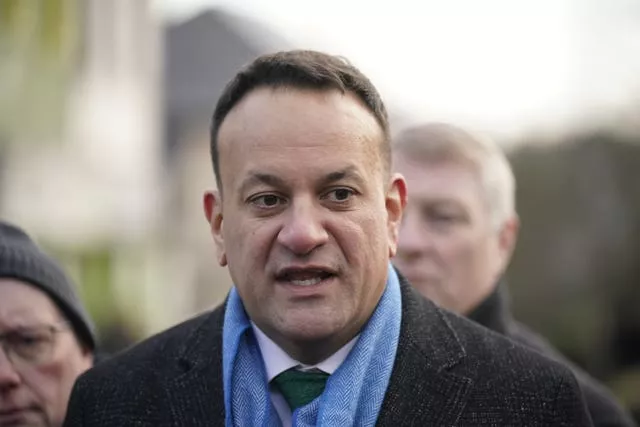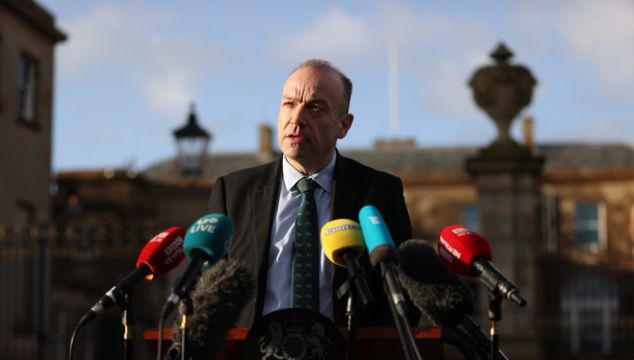The UK government “profoundly regrets” a move by Ireland to legally challenge its legislation to deal with Northern Ireland’s troubled past.
In a statement, Britain's secretary of state for Northern Ireland Chris Heaton-Harris slammed the case as “unnecessary” and warned it came at a “particularly sensitive time in Northern Ireland”.
“It did not need to be taken now, given the issues are already before the UK courts,” Mr Heaton-Harris said.
But earlier, Taoiseach Leo Varadkar said his government was left with “no option” but to legally challenge the UK government over the Legacy Act.
The Taoiseach said the “strong” legal advice was that the UK Legacy Act breached the UN Convention on Human Rights.
The Act received royal assent in September despite widespread opposition from political parties, victims’ organisations in Northern Ireland and the Irish Government.
Tánaiste and Minister for Foreign Affairs Micheál Martin said they were taking the case reluctantly after having spent time trying to change the UK government’s mind.

Amnesty International praised the Irish Government as “doing the right thing” for victims of Northern Ireland’s Troubles by “taking a stand”.
The Government is to argue that the provisions of the Northern Ireland Troubles (Legacy and Reconciliation) Act 2023 are incompatible with the UK’s obligations under the European Convention on Human Rights.
Aspects of the laws include a limited form of immunity from prosecution for Troubles-related offences for those who co-operate with the new Independent Commission for Reconciliation and Information Recovery (ICRIR).
The new Act will also halt future civil cases and legacy inquests.

Multiple Troubles victims and family members are supporting a legal challenge against aspects of the Act at Belfast High Court.
The UK government also said it was prepared for the move by the Government, and would “robustly defend the legislation”.
Speaking on Wednesday, Mr Varadkar said: “The government took a decision that we will take an interstate case to the European Court of Human Rights in Strasbourg, seeking a judicial review of the UK Legacy Act.
“The attorney general’s advice on this is very strong, his advice is that the UK Legacy Act is in breach of the UN Convention on Human Rights. It’s also the view of the UN high commissioner and also the Council of Europe.
“It is something that we’re genuinely doing with a sense of regret, and would prefer not to be in this position, but we did make a commitment to survivors in Northern Ireland and to the families of victims that we would stand by them, respect their wishes and also stand by the Good Friday Agreement, which specifically references the European Convention on Human Rights.”
The Taoiseach added that the Stormont House Agreement had received consensus from both governments and parties in Northern Ireland.
He said: “The UK Government decided for their own reasons, and of course they have the right to do this, to go down a different path, which is the UK legacy legislation, which is now law.
“But we don’t agree with that, we think that the agreement agreed by the parties in Northern Ireland, the two governments is the better approach and we think at this stage we really have no option but to ask the European Court of Human Rights in Strasbourg to carry out a judicial review of this legislation.”

Mr Martin said: “This decision was taken after much thought and careful consideration.
“I regret that we find ourselves in a position where such a choice had to be made.
“However, the decision by the British Government not to proceed with the 2014 Stormont House Agreement and instead pursue legislation unilaterally, without effective engagement with the legitimate concerns that we, and many others raised left us with few options.
“The British Government removed the political option, and has left us only this legal avenue.”
In his statement on Wednesday evening, Mr Heaton-Harris also challenged the Government on its approach to legacy, describing it as “inconsistent”.
“At no time since 1998 has there been any concerted or sustained attempt on the part of the Irish state to pursue a criminal investigation and prosecution-based approach to the past,” he said.
“We note, in particular, the former Irish justice minister and attorney general’s 2014 reference to an informal decision on behalf of the Irish government to not investigate Troubles cases – something that he restated publicly in 2021 in response to our proposals.
“Indeed the Irish government should urgently clarify the number of criminal prosecutions brought in Ireland since 1998 relating to Troubles cases.”
He also added: “It is also a matter of public record that successive UK and Irish governments during the peace process worked closely together on a range of initiatives which have provided conditional immunity and early release from prison.”
His statement concluded by describing the UK government’s bilateral relationship with Ireland as “one we value deeply”.

“Despite this misguided action, we will continue to work to minimise the consequences and protect the interests of the people and businesses that bind us together,” he added.
Meanwhile, DUP leader Sir Jeffrey Donaldson accused the Government of “double standards”.
Mr Donaldson told the BBC: “I think there are double standards on the part of the Irish government here and whilst I am strongly opposed to the Government’s amnesty plans, we voted against it, we spoke against it and we continue to oppose it, but I don’t think the Irish government are in a very strong position to point the finger at the UK Government because the Irish government have no proposals to deal with the legacy issues.
“No proposals to deal with the quite significant number of murders that were committed either in their jurisdiction or from their jurisdiction.
“For years effectively there has been a form of amnesty in the Irish Republic because they have not actively pursued those responsible for these crimes.”







